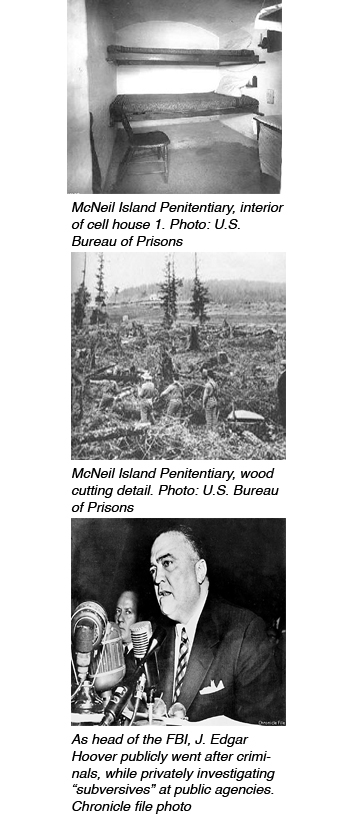Part 7 Escape! Epilogue
Part 7 Escape! Epilogue

Escape
On a foggy day late January, 1940, William Dempsey escaped from the McNeil Island penitentiary road camp.
Bunnell heard of the event on the radio and immediately contactd FBI Director J. Edgar Hoover. Bunnell complained that Dempsey's letters during the last five years had been abusive, and he wondered why murderers were permitted "to send out the kind of stuff they do and get it into the United States mail."
Bunnell frankly was afraid for his life, and asked Hoover to keep him posted on the escape. Hoover responded with a soothing letter expressing gratitude for background materials the former judge had made available and assured him that all was being done to recapture the prisoner.
Guards swarmed the island and 14 miles of beachline but they failed to find Dempsey. They had no clues as to what had happened to him. Police also searched the Olympic Peninsula on the theory that the convict "either by swimming or by clinging to a piece of driftwood, was able to get across the 800 yards of frigid Puget Sound water and reach the peninsula near Longbranch.
William Dempsey was never found.
Epilogue
Thirteen years later, Dempsey's name popped up in the October 1953 issue of Master Detective. The writer, R.J. Gerrard, titled his feature story, "Blonde in the Wilderness: She Thought He Was A Good Businessman, But His Business With Her Was . . . Murder."
Gerrard wrote that two days after the escape on Jan. 30, 1940, a bedraggled individual approached a local clergyman in Bremerton, Wash., and pleaded for some cast-off clothing. The clergyman gave him a decent outfit. That night a photograph of Dempsey appeared in the local paper and the clergyman at once notified the federal officials and told them that he had, unwittingly, lent aid and comfort to the fugitive killer.
Perhaps Dempsey survived the swim to safety, or he may have drowned. If he survived, he did not make a single small slip to his recapture. He presumably had learned to control his braggart nature and quick temperament, avoid brawls and keep clear of anything that could have aroused suspicion.
Dempsey was never recaptured, and did not return to Alaska to exact revenge, as Bunnell likely feared, to the end of his life.
On Nov. 1, 1956, Bunnell died of a heart attack in a California nursing home. He had been in poor health throughout the summer and fall of that year.
